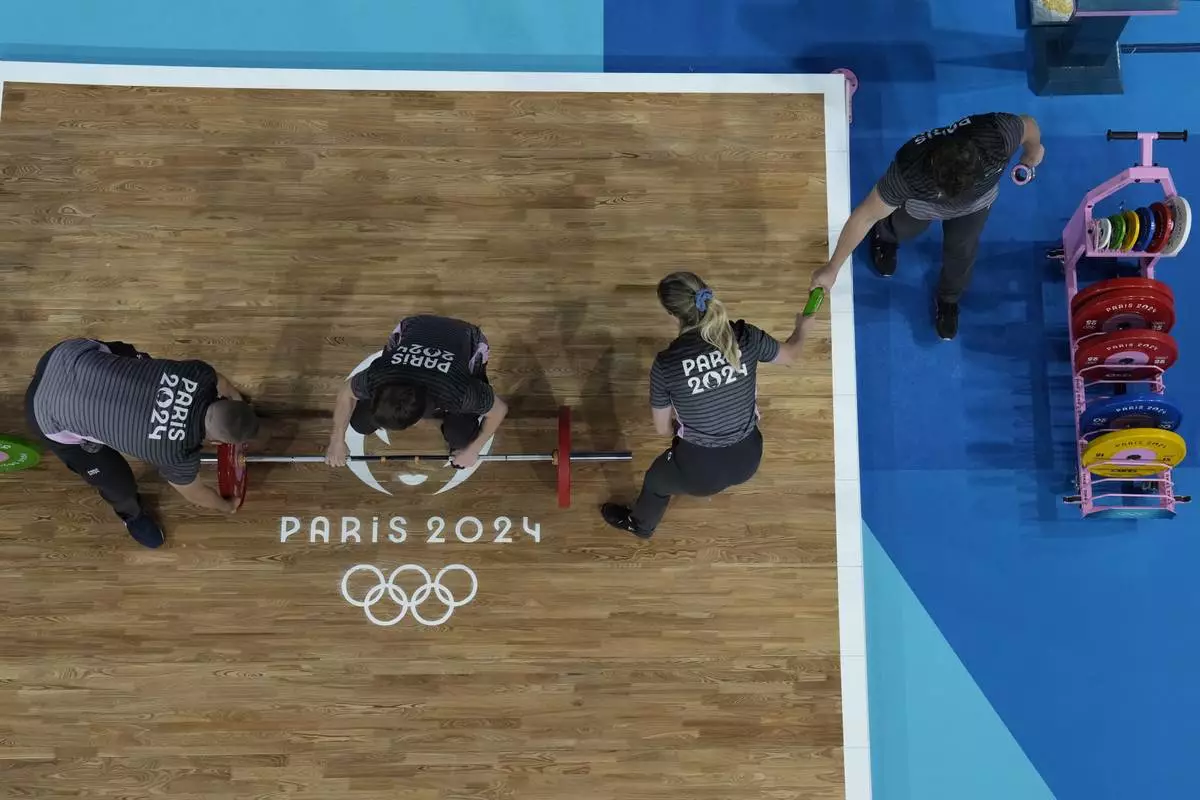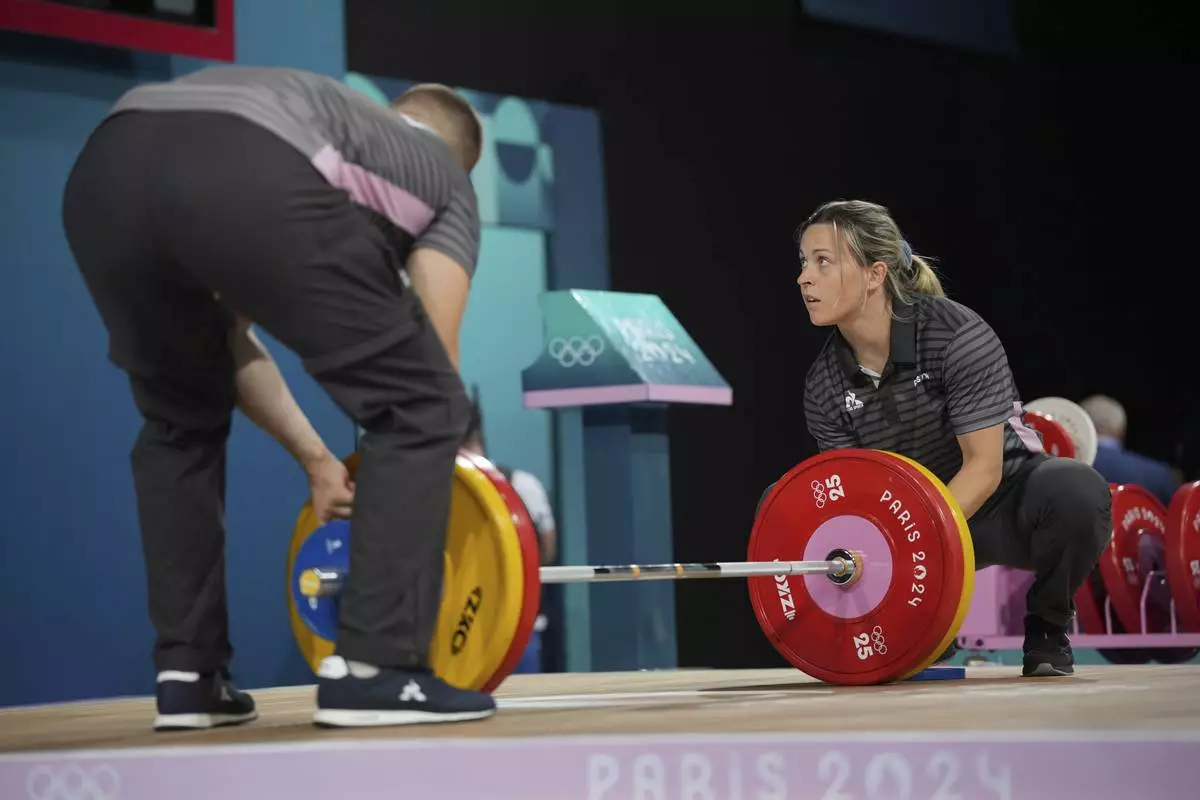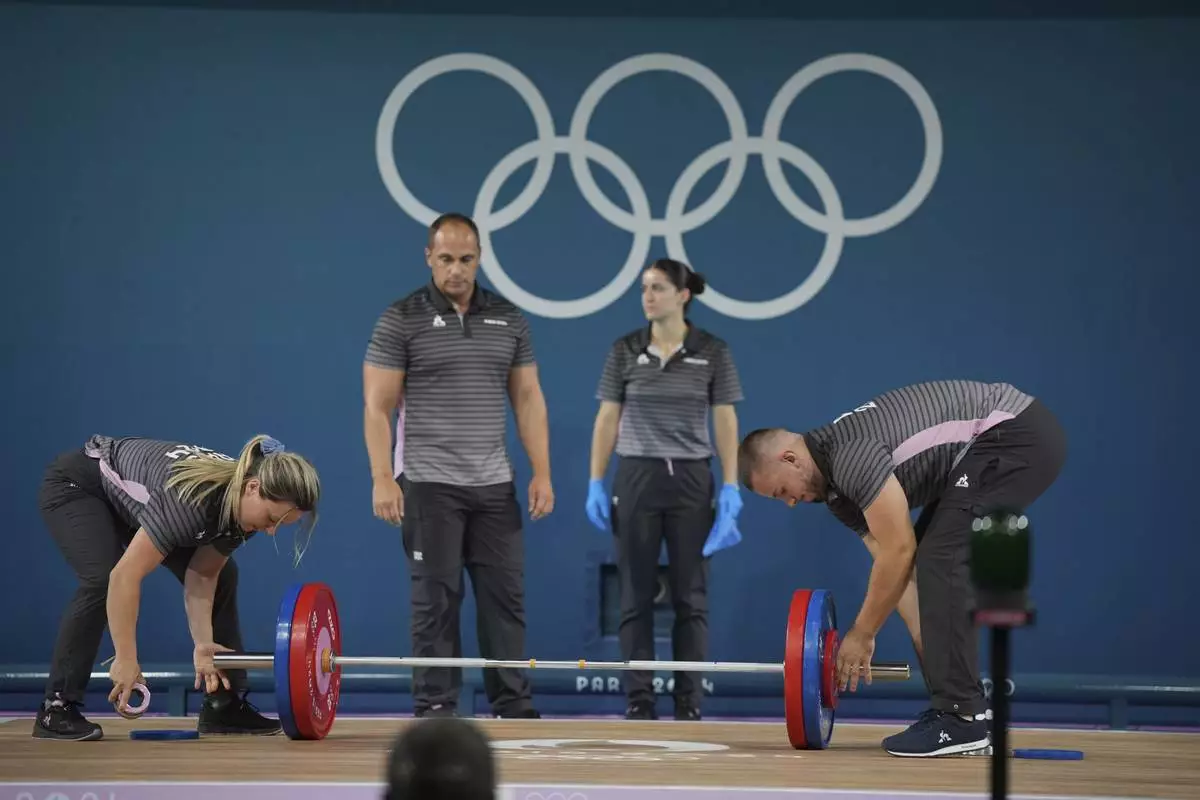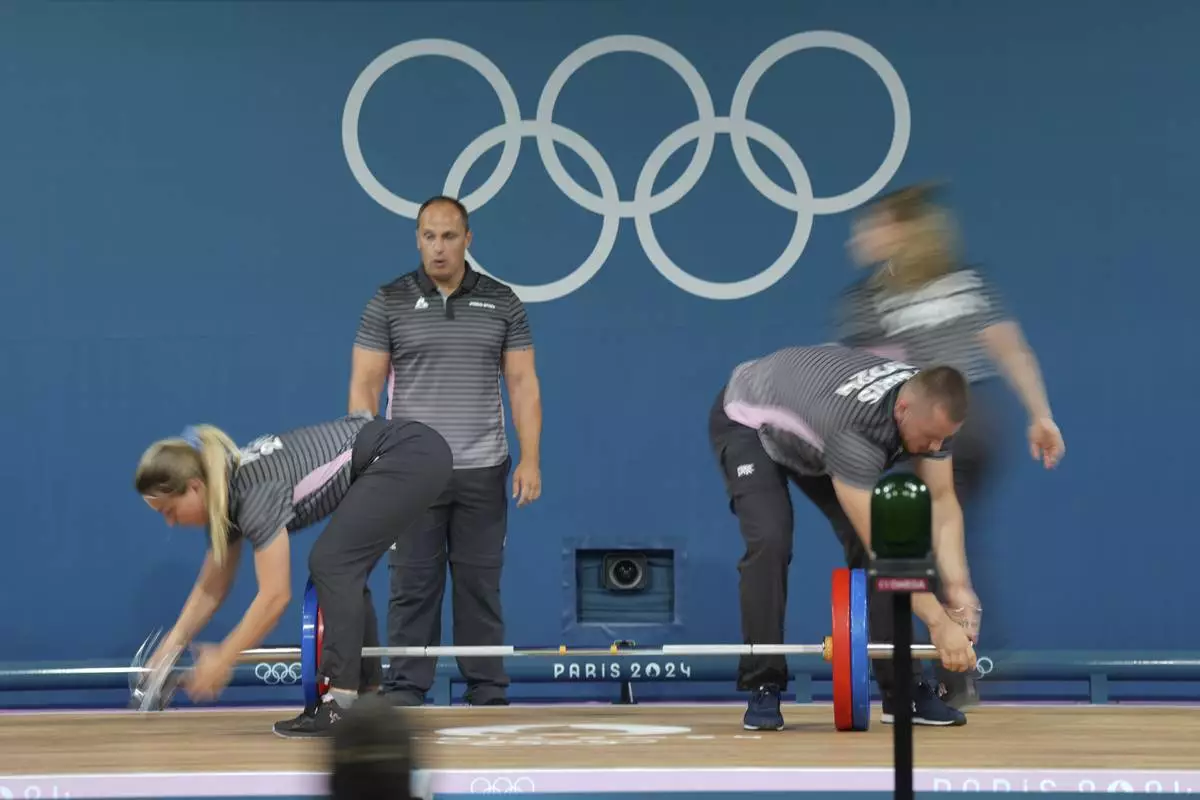PARIS (AP) — A hulking weightlifter raises a bar of more than 300 pounds (135 kilograms) and swiftly drops it the ground, followed by cheers cascading down from the crowd. Before another competitor can step up, a handful of people seated nearby scurry up the stairs and onto the stage to reset.
They remove discs and bolt new ones on either side, clean the bar and reposition it in the perfect spot. Every few tries, someone wipes down the platform like a basketball court. Weight attempts change on the fly mid-competition, so they are constantly asked to make multiple adjustments.
Click to Gallery
Loaders set the weight on the bar, during the women's 59kg weightlifting event, at the 2024 Summer Olympics, Thursday, Aug. 8, 2024, in Paris, France. (AP Photo/Dita Alangkara,Pool)
Loaders set the weight on the bar during the women's 59kg weightlifting event at the 2024 Summer Olympics, Thursday, Aug. 8, 2024, in Paris, France. (AP Photo/Kin Cheung)
Loaders set the weight on the bar during the women's 59kg weightlifting event at the 2024 Summer Olympics, Thursday, Aug. 8, 2024, in Paris, France. (AP Photo/Kin Cheung)
Loaders rush to set the weight on the bar for the next competitor during the women's 59kg weightlifting event at the 2024 Summer Olympics, Thursday, Aug. 8, 2024, in Paris, France. (AP Photo/Kin Cheung)
Loaders set the weight on the bar during the women's 59kg weightlifting event at the 2024 Summer Olympics, Thursday, Aug. 8, 2024, in Paris, France. (AP Photo/Kin Cheung)
Weightlifting would not be possible at the 2024 Paris Olympics or anywhere else without loaders, who perform a role similar to pit crews changing tires and refueling race cars. It's a fast-paced, essential task to make sure the bar weighs what it is supposed to weigh — quickly — and the conditions are their best for the top lifters in the world to do what they have spent the past four years training for.
“The priority is to stay calm because if you are not calm, you’re going to get in a rush and make many mistakes,” loader Jessy Graillot told The Associated Press on Thursday. “We have to stay calm and communicate a lot with the team. We all have work to do, and we know what to do.”
Graillot is one of 14 loaders at the Paris Games, all from France's under-23 and under-20 weightlifting teams. Many of them went through a test event to get a sense of the responsibilities, and the entire co-ed group split evenly between seven men and seven women had two hours of training before weightlifting began Wednesday.
“We just practiced how to load the bar, what are some of the protocols that we have to follow in order for everything to be perfect and to look perfect, as well, because it is the Olympics, so everything needs to be in order,” loader Lea Marie Antonio said. “They told us there have been no mistakes since London 2012, so no mistakes were made in the loadings of the bars in the Olympics since 2012. I think if we don’t make a mistake, we can call it a good night.”
Avoiding mistakes at a major international event carries with it some natural stress, but Laurène Fauvel does not consider it pressure. Her biggest issue is when she and her fellow loaders get criticized by Olympic lifters or fans on social media when someone slips.
“Some athletes or the public say, ‘Oh, the loaders are not cleaning good,'” Fauvel said. "It’s just 1% of the public, but it’s sad to have this feedback."
Slipping was an issue on the first day of weightlifting, Hampton Morris said after becoming the first U.S. man to win an Olympic medal in the sport in 40 years, but he said the paint from the Paris 2024 logo was the problem. Nothing loaders can do about that.
They are not earning medals, but they do have a sense of whether they are doing a good job at any given time.
“I think it’s a bit of a feeling,” said Graillot, who is 21. “When you make mistakes, when we are in a rush, we don’t feel confident. When we feel confident, I think it’s a success.”
Just getting here is a win, and it is an experience the French Weightlifting Federation wants them to have seeing the Olympics up close. Fauvel enjoys seeing the lifters' rituals and has learned more about rules and from speaking to experienced members of the jury who have judged events for decades.
“They wanted us to actually see what it’s like to be in the Olympics and what it is that we work for, actually, so that's why they called us to be on the team," said Antonio, a 19-year-old from eastern France.
Graillot, who trains alongside Antonio, sees parallels to auto racing pit crews — with a bigger dose of patience to get it right.
“Maybe we can compare it because we are a team and we all have one job to do,” he said. “But it is way more calm. We don’t have to be in a rush like in racing.”
It's an important job but also a fun one for the French weightlifters who hope to one day — perhaps in Los Angeles in 2028 or Brisbane in 2032 — be at the Olympics themselves. Yamm Thomasson said of the time he his having, “C'est magnifique.”
“You feel all the chemistry of the Olympics,” Thomasson said in French with Graillot interpreting. “It’s a beautiful opportunity. It is once in a lifetime.”
AP Olympics: https://apnews.com/hub/2024-paris-olympic-games

Loaders set the weight on the bar, during the women's 59kg weightlifting event, at the 2024 Summer Olympics, Thursday, Aug. 8, 2024, in Paris, France. (AP Photo/Dita Alangkara,Pool)

Loaders set the weight on the bar during the women's 59kg weightlifting event at the 2024 Summer Olympics, Thursday, Aug. 8, 2024, in Paris, France. (AP Photo/Kin Cheung)

Loaders set the weight on the bar during the women's 59kg weightlifting event at the 2024 Summer Olympics, Thursday, Aug. 8, 2024, in Paris, France. (AP Photo/Kin Cheung)

Loaders rush to set the weight on the bar for the next competitor during the women's 59kg weightlifting event at the 2024 Summer Olympics, Thursday, Aug. 8, 2024, in Paris, France. (AP Photo/Kin Cheung)

Loaders set the weight on the bar during the women's 59kg weightlifting event at the 2024 Summer Olympics, Thursday, Aug. 8, 2024, in Paris, France. (AP Photo/Kin Cheung)
BIRMINGHAM, Ala. (AP) — On a day when stock markets around the world dropped precipitously, Alabama Republican Party Chairman John Wahl led a celebration of the president whose global tariffs sparked the sell-off.
With no mention of the Wall Street roller coaster and global economic uncertainty, Wahl declared his state GOP’s “Trump Victory Dinner” — and the broader national moment — a triumph. And for anyone who rejects President Donald Trump, his agenda and the “America First” army that backs it all, Wahl had an offer: “The Alabama Republican Party will buy them a plane ticket to any country in the world they want to go to.”
Wahl's audience — an assembly of lobbyists and donors, state lawmakers, local party officials and grassroots activists — laughed, applauded and sometimes roared throughout last week's gala in downtown Birmingham, the rare Democratic stronghold in one of the nation’s most Republican states. The president’s son Donald Trump Jr. elicited perhaps the most enthusiasm with an unapologetically partisan pitch, even repeating the lie that his father won the 2020 election over Democrat Joe Biden.
Yet beyond the cheerleading, there were signs of a more cautious optimism and some worried whispers over Trump’s sweeping tariffs, the particulars of his deportation policy and the aggressive slashing by his Department of Government Efficiency.
That doesn’t mean Trump or Republicans are in danger of losing their grip in Alabama, where the GOP holds all statewide offices, dominates the Legislature and has won every presidential electoral vote since 1980. But it’s a notable wrinkle in a place where there's long been tension between relying on the federal government for funding and jobs, and an embrace of the kind of anti-Washington, anti-establishment populism that has twice propelled Trump to the Oval Office. And any cracks for Trump in Alabama — where he got 65% of the vote in 2024 — could portend trouble elsewhere, as the effects of a seismic shift in U.S. policy reach across the economy and society.
“There are some concerns, some conversations,” said John Merrill, a former secretary of state, over just what Trump’s agenda will mean on the ground. Alabama, he acknowledged, has “been a net recipient” of the very federal government and economic model Trump is upending, meaning it receives more money back from Washington than its taxpayers send the federal government.
“It’s a big risk,” said Merrill, who sported a Trump 45-47 pin on his lapel, a nod to the president's two terms.
Blocks to the south of the complex where Republicans convened sits the multibillion-dollar University of Alabama at Birmingham health system, a regional gem where research depends on grants from the National Institutes of Health.
Republican Alabama Attorney General Steve Marshall, listed as a “Silver Sponsor” of the gala, didn't join the Democratic attorneys general suing the Trump administration to stop the cancellation of certain research funding streams Congress already has approved.
Most of the medical services provided at UAB and many other hospitals throughout the state are covered by Medicare and Medicaid, two of the largest federal outlays. Alabama, because its per-capita income ranks among the lower tier among states, has one of the most generous federal match rates for Medicaid funding.
A short drive west toward Tuscaloosa sits a gargantuan Mercedes-Benz complex, one of the earliest examples of foreign auto manufacturers coming to the American South, where state laws are hostile to organized labor. The plants have provided jobs at wages higher than the local norms but in some cases lower than in union shops of the Great Lakes region around Detroit. Many suppliers have followed in the South, but not so many that the assembly plants don’t still import many parts that now will be subject to Trump’s tariffs.
Terry Martin, a county GOP committeeman in Tallapoosa County, said he supports the tariffs as leverage. Trump has “something to bargain with,” Martin said. But, “the parts that are coming from overseas … it’s going to pop it up” in price, he said, at least in the short term.
Agriculture, meanwhile, is still a dominant Alabama industry. Meat processing plants in the North and row crop farms in the South depend on migrant labor that Merrill, the former secretary of state, said involves workers who are in the U.S. both legally and illegally. Alabama, he recalled, passed its own strict immigration bill during Barack Obama's presidency only to roll it back after industry leaders complained of a depleted workforce.
Wahl, in an interview after the gala, took a more nuanced approach than he did at the podium.
“It is possible to secure our border and still take into account migrants who deserve to be here,” he said. “This has to be a two-pronged approach.”
Back in Birmingham, Interstate 65 splits the city. The aging, increasingly congested artery is a local priority for widening. The proposal has support from Alabama's two Republican senators, Tommy Tuberville and Katie Britt. U.S. interstate projects, though, are typically a 90-10 split, meaning 90% of the money comes from Washington, 10% from the state.
That funding — along with money for schools, Medicaid and other areas — could be at risk with Trump adviser Elon Musk and DOGE carrying Trump’s blessing to slash spending. GOP lawmakers who control Congress have supported Trump's agenda, which also includes dismantling the Education Department.
Tallapoosa County GOP Chair Denise Bates said “absolutely” there's a possibility DOGE could go too far. “I hope there are guardrails,” she said, noting she was once a local school board member.
“Am I 100% for getting rid of the Department of Education? I can’t say that I am,” she said, adding a phrase similar to Merrill’s description of the state as a whole. “You know, we’re a net receiver.”
Yet for all the caveats offered in one-on-one conversations, the GOP crowd cheered when Tuberville, the former football coach turned Trump acolyte on Capitol Hill, offered a plainspoken defense of Musk and his pop-up agency, telling the crowd, “We're dead broke.” And they roared as he addressed tariffs.
“It's past time we level the playing field and tell the rest of the world to get off their ass and start paying their fair share,” Tuberville said.
Bates argued that Alabama's embrace of Trump's “America First” push is not simply loyalty to the president. She said it reflects generations of voters watching the steel industry decline in Birmingham and, after the North American Free Trade Agreement was enacted in 1994, the textile industry leaving for Mexico and, eventually, Southeast Asia.
“We just want jobs,” she said.
Still, state Sen. Jabo Waggoner, the longest-serving member of the Alabama Legislature, made clear Trump's visceral appeal, declaring him “the most popular president here since Ronald Reagan, hands down.”
Wahl recalled Trump’s first massive outdoor rally as a presidential candidate: 30,000 people at Ladd-Peebles Stadium in Mobile, Alabama, in August 2015.
Wahl, who owns a butterfly farm outside Huntsville, said perhaps the best way to understand Trump and Alabama and this moment of uncertainty is to see a president who, at least to his supporters in the state, has earned the benefit of the doubt.
“He’s going to let everybody know he’s serious,” the chairman said. Trump is “going to bring people to the bargaining table. We’re actually going to see the negotiator conduct business.”

A guest looks over the program for Donald Trump Jr.'s visit to speak at the Alabama Republican Party's Trump Victory Celebration, Thursday, April 3, 2025, in Birmingham, Ala. (AP Photo/Butch Dill)

Alabama Sen. Jabo Waggoner, left, high fives a guest as they wait for Donald Trump Jr. to speak at the Alabama Republican Party's Trump Victory Celebration, Thursday, April 3, 2025, in Birmingham, Ala. (AP Photo/Butch Dill)

Donald Trump Jr. speaks at the Alabama Republican Party's Trump Victory Celebration, Thursday, April 3, 2025, in Birmingham, Ala. (AP Photo/Butch Dill)

Alabama Republican Party Chair, John Wahl, speaks before Donald Trump Jr.'s visit at the Alabama Republican Party's Trump Victory Celebration, Thursday, April 3, 2025, in Birmingham, Ala. (AP Photo/Butch Dill)

Alabama Republican Party Chair, John Wahl, speaks before Donald Trump Jr.'s visit at the Alabama Republican Party's Trump Victory Celebration, Thursday, April 3, 2025, in Birmingham, Ala. (AP Photo/Butch Dill)































































